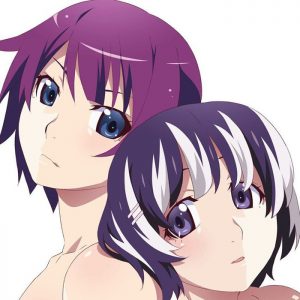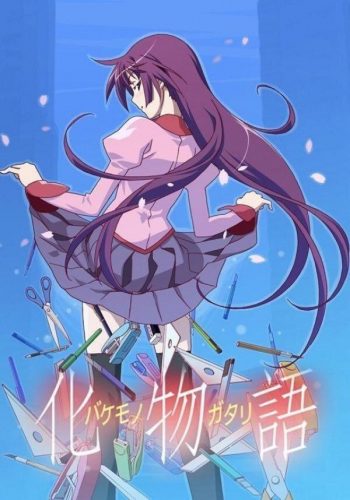
Bakemonogatari is not an entry-level anime. If you hope to wrangle a newbie into the anime fandom by showing them this, you may have just doomed them to a life of terrible Netflix dramas, as they will forever think of anime as kind of weird, at least, and incredibly perverse at most. One of the reasons for this is the copious amounts of Japanese language wordplay that runs throughout the series. Sure, kind translators cover the screen in walls of text, attempting to explain how this joke works and how it could best be translated into English. Yet, for non-native speakers, the struggle is real. Still, once you uncover the majesty and layered meanings of some of these jokes, the show reaches an entirely new tier of amazing. Let’s take a look at some of the simple and more complicated gags that litter the Monogatari franchise!
The Simple Pun
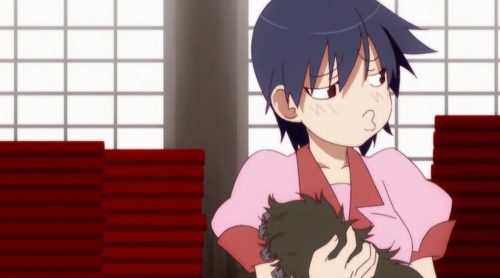
Let’s start things off with the easiest to digest of Monogatari’s wordplay - the pun. The title in and of itself is an example of this. The Japanese word “Bakemono” meaning “Monster”, and the word “Monogatari” meaning “Story”, already tells us the kind of narrative we’re in for. While Monogatari is several character studies over the backdrop of a vampire plot, it is still essentially a story about monsters. However, with the jovial pun used in place of a more spooky title, we know that perhaps the monsters will not play such a major role in the story or at least do not pose such an impact on the story when compared to the character interactions.
Another great pun is the combination of Kanbaru Suruga and Hitagi Senjougahara. Kanbaru quickly shone as the school’s basketball ace, causing Senjougahara - the track ace - to take notice of her underclassman. The pair were dubbed the “Valhalla Combo” due to their unwavering Viking-like strength. The Valhalla combo, however, is created as a portmanteau from Kanbaru’s “Baru” and Senjougahara’s “Hara”, thereby forming the “Baruhara Combo” as it would sound in spoken Japanese.
The Complex Kanji
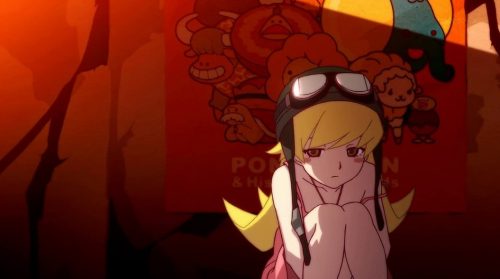
One of the most difficult things to understand when watching this series is how every kanji used plays an integral role in forming an interesting gag. Let’s take the series mainstay and vampire queen herself…*ahem* - Kiss-Shot Acerola-Orion Heart-Under-Blade! Phew, what a mouthful! Strange name, right? Well, not as strange as you might think. After entering her child form, the vampire queen is renamed Oshino Shinobu using this kanji - 忍野 忍. The top part of the first kanji compound (刃) can be translated to “knife”, while the second (心) can be translated to “heart”. When placed directly atop each other to be read as “Oshino Shinobu”, the heart is literally under the blade!
Oh, but it doesn’t stop there. You see, the writer of Bakemonogatari loves all things to do with wordplay. It’s not uncommon to come across a pun here or a piece of wordplay there. However, what this writer loves above all else, are palindromes (words or phrases that read the same in both directions). His pen name is Nisio Isin which is probably inspired by this obsession for the type of wordplay, as “NisioIsin” is, in itself, a palindrome. What else did we just study that is also a palindrome? You guessed it; the kanji for Oshino Shinobu is the same frontwards and backward! It’s truly incredible the amount of thought that goes into naming these characters. Not one to simply slap a “John” or a “Mike” onto his mainstay cast members. Each character is given a studious amount of time to create a name littered with inside jokes!
The “Hopefully Reincarnate as a Japanese Native to Understand the Culture” Reference
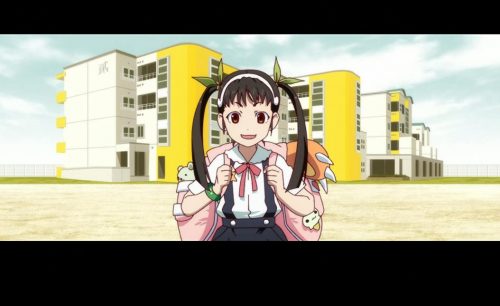
Finally, let’s end this list with a look at some of the most culturally reliant jokes that we foreigners could never hope to pick up on, even with a native understanding of the language. Hachikuji Mayoi was the lost snail child who, we come to discover, also lost her life when trying to reach her mother on Mother’s Day. Tragic circumstance aside, her name holds incredibly deep meanings. “Hachi” means eight but is also sometimes spoken as “Ya” (八つ - “Yatsu” is used as a counting method for certain objects that total eight in number). “Kyu” means nine but is also sometimes spoken as “Ku” (“September” in Japanese is spoken as 9月 or “Ku Gatsu”). When we combine “Ya” and “Ku” together - we get “Yaku” which when written using this kanji - 厄 - means “misfortune”. We see how those who follow Hachikuji are doomed to become lost forever in the story. Her name is the first hint we receive to her sinister backstory.
However, her kanji is not where this train ends, oh no. The Shikoku Pilgrimage is a Buddhist ritual of visiting 88 temples on the island of Shikoku. Hachikuji’s name is written as such: 八九寺, with the final kanji “Ji” meaning time or temple. Traveling to these 88 temples is seen as paying respect to one’s religion (as with any religious pilgrimage). Other Monogatari blogs have pointed out that perhaps, overstepping this boundary and traveling to an additional temple, is going beyond what God wants for us and can only lead to disaster. Should this be the case, “Hachikuji” literally meaning “eight-nine-temple”, could be the vessel for horrible disaster to come should people choose to follow her. Imagine trying to watch an episode of this show but having this Star Wars-style credit roll going on throughout! How are we supposed to figure this kind of stuff out!?
Final Thoughts
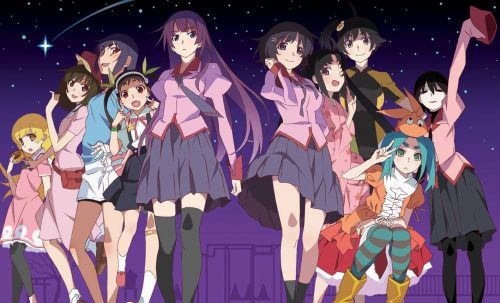
Bakemonogatari with its sequels, prequels, spinoffs, and movies, is an incredibly complex and well-written anime. Learning Japanese through anime is often seen as a fruitless endeavor and while perhaps that outlook holds some weight, there is nothing wrong with being inspired to study Japanese in order to understand anime on a deeper level. Hopefully, taking a look at some of these puns gives you the motivation to dust off that Elementary school grammar textbook and get back to studying! What is your favorite moment of the Monogatari series? Let us know down below!
Recommended Post
In What Order Should You Watch Bakemonogatari?
Recommended Post


